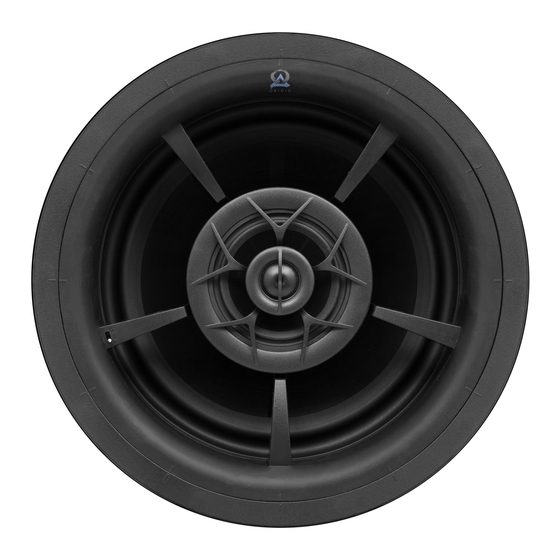Table of Contents
Advertisement
Quick Links
Advertisement
Table of Contents

Summary of Contents for Origin Acoustics Director D100 Series
- Page 1 D100 Series Director Collection Installation Manual D109, D107, D105...
-
Page 2: Table Of Contents
Table of Contents Introduction Specifications What’s Included Tools & Items Wire Recommendation Speaker Placement About Speaker Wire Installing the Wire Wire Routing Painting the Grille Cutting the Hole Installing the Bayonet Ring Connecting the Wire Installing the Speaker Testing & Adjustments Installing the Grille Troubleshooting Technical Assistance... -
Page 3: Introduction
Introduction Thank you for purchasing the Director 10 In-Ceiling Speaker. At Origin Acoustics, we take pride in providing you with a high quality product. All of Origin Acoustics’ speakers are designed to have excellent sound quality, longevity, and a simple installation process. -
Page 4: Specifications
Specifications Model D109 D107 D105 Part Number SCD100900 SCD100700 SCD100500 Woofer Cone Kevlar Glass Fiber Woofer 10" (254mm) 10” (254mm) 10” (254mm) Diameter Mid-Range Kevlar Glass Fiber Dome Mid-Range 4” (102mm) 4” (102mm) 4” (102mm) Diameter Tweeter Dome Silk DPSD Silk DPSD Silk DPSD Tweeter... -
Page 5: What's Included
What’s Included Speaker Bayonet Ring Grille Template Tools & Items • Drywall Saw • Measuring Tape • Stud Finder • Speaker Wire • Drill • Fish Tape • Pencil • Drill Bit ⅛” (3mm) • Spray Paint • Wire Stripper •... -
Page 6: Speaker Placement
Auxiliary Room (2 Speaker Placement) Ideally, the two speakers should be placed an equal distance from the lis- tener. If the room has a lower ceiling, 6’ (2m) the speakers can be closer together. Also, if the speaker placement is in- 3’... -
Page 7: About Speaker Wire
About Speaker Wire Use a two conductor wire that allows you to identify one conductor from the oth- er. This designation may be obvious or as subtle as a ridge on one conductor. It’s crucial that you keep track of which wire you use for positive (+) and negative (-). -
Page 8: Wire Routing
Wire Routing Plan how you’ll route the wire to the desired speaker location. There are several methods for routing the wire, and you may need to combine several of them. Behind the Baseboard Through Walls The wire can be routed behind the When running wires through a wall, be baseboard by cutting a groove out of sure to avoid all obstacles such as AC... -
Page 9: Painting The Grille
2. Painting the Grille In some situations the speakers may look better if the color matched the walls, ceiling, or trim in the room. This can be accomplished by painting the grille. The grille must be painted with spray paint, and most hardware stores will mix a can of paint to match whatever color you need. -
Page 10: Installing The Bayonet Ring
plate, check the Specifications section for cutout sizes.) If you’re unsure on wheth- er there may be obstacles (such as pipes or wires) where you plan on installing the speaker, drill a ⅛ inch hole in the center of the circle, then put a bent coat hanger through the hole to feel around. -
Page 11: Connecting The Wire
5. Connecting the Wire Push down to open the connector. Insert the wires into the connectors, making sure that the positive wire is being attached to the red connec- Connector tion and the negative wire is being attached to the black connection. If Speaker Wire the wires are switched, speaker perfor-... -
Page 12: Testing & Adjustments
7. Testing & Adjustments The midrange and tweeter can be pivoted to direct the sound towards the listen- ing area. Or for a more diffused surround sound experience, the rear speakers can be aimed towards the wall. To aim the tweeter, gently apply pressure to the rim with your thumbs to pivot the tweeter. -
Page 13: Troubleshooting
Troubleshooting If you have a problem, try isolating it first. For example, if you’re playing a DVD and there is no sound, try replacing the DVD with an MP3 player to see if you get sound. If it does work, then the problem is with the television, DVD player, or the cables connecting them. -
Page 14: Technical Assistance
If you are considering returning the product, it’s required that you contact Origin Acoustics prior to any return at- tempts. This way we can determine if the issue can be resolved without returning the product, or if needed we can provide instructions and support for the return process. -
Page 15: Warranty
Limited Lifetime Warranty Origin Acoustics warrants to the original retail purchaser only that this Origin Acoustics product will be free from defects in materials and workmanship, pro- vided the speaker was purchased from an Origin Acoustics authorized dealer. If the product is determined to be defective, it will be repaired or replaced at Ori- gin Acoustics’... -
Page 16: Return Process
Before making any return attempts, it is required that you first contact Origin Acoustics. Return product to Origin Acoustics or your dealer, either in person or by mail. It’s preferable if the product is returned in the original packaging. If this isn’t possible, the customer is responsible for insuring the shipment for the full value of the product. - Page 18 • 844-674-4461 ©2017 Origin Acoustics...

















Need help?
Do you have a question about the Director D100 Series and is the answer not in the manual?
Questions and answers